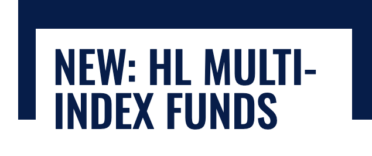 Passively managed funds, such as index funds and exchange-traded funds (ETFs) offer a low-cost way to create a balanced portfolio that benefits from broad market movements. If you are looking to invest in an index fund or ETF you will need to choose an investment platform to enable you to do so.
Passively managed funds, such as index funds and exchange-traded funds (ETFs) offer a low-cost way to create a balanced portfolio that benefits from broad market movements. If you are looking to invest in an index fund or ETF you will need to choose an investment platform to enable you to do so.
In this article, we look at the best ways for investors in the UK to access these funds and outline the key considerations. The two main choices are:
- Investing in index funds and ETFs with a do-it-yourself investment platform
- Investing in index funds and ETFs with a robo-adviser
In the table below we outline the key features of these options, highlighting the advantages and disadvantages and helping you identify which is best for your circumstances.
| Type | Advantages | Disadvantages | Best for... |
| Do-it-yourself investment platform | Typically a good range of investment choice, including options apart from index funds and ETFs.
Flexibility in creating your own portfolio, with some guidance and support |
Can be more expensive than a robo-adviser.
Requires a greater level of input from the individual investor |
Those wanting to go with a do-it-yourself option that gives a good level of choice of what to include in your portfolio |
| Robo-advisers | A straightforward approach for those with little to no existing investment knowledge.
Allows you to manage your portfolio on autopilot |
Lacks flexibility and investment choice for those who want to deviate from a pre-determined portfolio | Beginners who want someone else to make the investment decisions for them |
Investing in index funds and ETFs with an investment platform
A standard investment platform provides access to a wide range of investment vehicles, including active and passive funds, shares, investment trusts and ETFs. They typically combine ready-made portfolios with the option to create your own from the investment choices on offer. This is generally accompanied by research, market commentary and investment guides. They give the potential for a more tailored approach than robo-advisers, but also require a greater level of engagement from the investor, including making decisions on how to position your portfolio and how and when to make changes to it.
Choosing the best platform can be a minefield, requiring you to navigate cost, service and investment choices, as well as any additional features the individual providers may offer. In the table below we outline the offering from a selection of the main players.
General investment platforms to invest in index funds or ETFs with
| Standard investment platform | Wrappers | Investment types | Charges | Details |
| Interactive Investor* | Stocks & Shares ISA, Junior ISA, SIPP and trading platform | 40,000 UK & global investment options including 3,000+ funds, shares, investment trusts, bonds, ETFs, gilts and currency | From £4.99 per month | Full Interactive Investor review |
| Hargreaves Lansdown* | Stocks & Shares ISA, Junior ISA, Lifetime ISA, General Investment Account | 3,750+ funds, UK, Canadian and European shares, corporate and government bonds, ETFs and Investment Trusts | Index Funds
0.45% up to £250,000, 0.25% £250,001-£1m, 0.10% over £1m ETFs ISA - 0.45% capped at £45 per year, Lifetime ISA - 0.25% capped at £45 per year, SIPP - 0.45% capped at £200 per year Dealing fees for ETFs - £5.95-£11.95 depending on the number of deals placed |
Full Hargreaves Lansdown review |
| AJ Bell* | Stocks & Shares ISA, Junior ISA, Lifetime ISA, SIPP, Junior SIPP and General Investment Account | 2,000+ funds, shares, investment trusts, ETFs, range of passive portfolios | 0.25% up to £250,000, 0.10% £250,000- £1m, 0.05% £1m-£2m, No charge over £2m | Full AJ Bell review |
| Vanguard | Stocks & Shares ISA, Junior ISA, General Investment Account and SIPP | 86 Vanguard funds | 0.15% up to £250,000, No charge over £250,000 | Full Vanguard review |
| Bestinvest* | Stocks & Shares ISA, Junior ISA, SIPP and General Investment Account | 3,750+ funds, UK & US shares, investment trusts and ETFs |
0.40% up to £250,000, 0.20% £250,000-£500,000, 0.10% £500,000-£1m, No charge over £1m
|
Full Bestinvest review |
| InvestEngine | Stocks & Shares ISA, SIPP and General Investment Account | 700+ ETFs (Does not offer index funds) |
FREE (No platform fee or product fees)
|
Full InvestEngine review |
Among the biggest names in this space are Hargreaves Lansdown and Vanguard Investor. Indeed, Vanguard is synonymous with passive investing having championed this low-cost way of investing and securing global assets under management of over $7.2trn in the process. It now has Vanguard Investors in the UK, an investment platform that provides access to its 86 index funds, although you can also invest in all of these funds through the other online trading platforms listed above. Hargreaves Lansdown, meanwhile, is the largest UK platform, offering a greater level of investment choice, including direct investments in shares and access to a wide range of index funds and ETFs.
Again, investors will need to consider which features are most important to them and how they weigh-up against the platform fees. Hargreaves Lansdown isn't the cheapest, but then does offer a lot in terms of the services and onsite functionality that it provides. Other platforms such as Bestinvest offer flexible ISAs, which may be attractive to some investors, while AJ Bell has the widest selection of wrappers, including a Junior SIPP. The cheapest way to invest in ETFs is via InvestEngine as DIY investors don't have to pay a platform or product fee. It means those investing in a Stocks & Shares ISA, SIPP or General Investment account only have to pay the underlying ETF costs, which start as low as 0.03%. The only downside is that you can't invest in index funds via InvestEngine.
Trading platforms - an alternative way to invest in index funds and ETFs
A further option for those looking to also invest in individual company shares, and not unit trust tracker funds, is to use a trading platform. While this is definitely not the best option for those who want to make regular trades, it may be of interest to those looking to take a more dynamic approach.
There is a range of providers available, ranging from simple, low-cost options through to those designed for frequent traders which provide a greater number of bells and whistles but at a higher cost, including CFD trading.
Generally speaking, investing through a trading platform is better suited to those with some degree of experience and knowledge of direct investments. While most of the platforms give a degree of support - perhaps with "best-buy" recommendations or stop-loss warnings - it will largely be down to the individual to manage their portfolios, deciding when and how much to invest and picking the individual holdings.
In the table below we outline some of the online trading platforms available in the UK, outlining their fee structures and general proposition.
| Online share-trading platform | Frequent trade charge | Standard charge per trade | Platform fees |
| Freetrade | 0% | 0% | £4.99 per month if investing within an ISA |
| eToro | 0% | 0% | Withdrawal fee and GDP to USD deposit conversion |
Investing in index funds or ETFs with a robo-adviser
Robo-advisers work by asking potential investors a range of questions to work out which types of investments will suit them best, based on factors such as risk appetite, investment horizon and goals. These answers are then filtered through to provide a ready-made portfolio, which is typically made up of low-cost, passive funds, such as index trackers and ETFs. The investor can then leave the portfolio to run on autopilot if they choose to, with tweaks and rebalancing taken care of by the provider. This makes them popular among those who are new to investing, although it can be challenging working out which robo-adviser to choose and assessing if the performance is in line with what you could achieve by building your own portfolio.
In the table below, we set out a summary of four of the main players in the robo-adviser sector in the UK, comparing charges, wrappers and the underlying portfolios they offer. There are links to in-depth reviews of each of them as well, so you can find out more about the nuts and bolts of each one. For a more detailed comparison of robo-adviser, check out our article "Robo-adviser Best Buy Table".
Robo-advisers to invest in index funds or ETFs with
| Robo-adviser | Wrappers | Portfolios | Platform charges | Details |
| Nutmeg | S&S ISA, JISA, LISA, GIA and SIPP | 10 fully managed portfolios, 10 SRI portfolios, 5 fixed allocation portfolios & 5 smart alpha portfolios | Up to £100,000 0.75%
Over £100,000 0.35% Reduced fees for fixed allocation |
Full Nutmeg review |
| Wealthify | S&S ISA, JISA, GIA and SIPP | 5 standard and 5 SRI portfolios - Cautious, Tentative, Confident, Ambitious & Adventurous plans | 0.60% flat fee | Full Wealthify review |
| Moneyfarm* | S&S ISA, GIA and SIPP | 7 fully managed portfolios, 7 SRI portfolios, 7 fixed allocation portfolios | 0.75% up to £10,000
0.70% £10,001-£20,000 0.65% £20,001-£50,000 0.60% £50,001-£100,000 0.45% £100,001-£250,000 0.40% £250,001-£500,000 0.35% over £500,000 Reduced fees for fixed allocation (from 0.25%) |
Full Moneyfarm review |
How to choose the best robo-adviser
As the table above shows, there are some significant differences between the various robo-advisers, as well as some key similarities. If, for example, you are keen to invest in an SRI-focused portfolio, Nutmeg and Wealthify stand out as good options.
If, however, your choice is going to be governed by how much you are looking to invest, with Wealthify's flat fee perhaps suits those with smaller pots, while Moneyfarm looks competitive if you have over £50,000 to invest.
It is worth reading our in-depth reviews of the various providers, as well as scrutinising their own websites, with many offering online calculators to give you a better idea of exactly how much you are likely to pay for their services, as well as the fund fees for the underlying holdings.
What is the best way to invest in an index fund or ETF?
The decision as to the best way to invest in an index fund or ETF is largely determined by what else you are looking to invest in with your portfolio and the level of choice and flexibility you require. Arguably, if you want pure exposure to a range of index trackers, simply opting for Vanguard Investor, perhaps through one of its LifeStrategy portfolios, would be the cheapest way to do so. Those happy to stick with ETFs and who are happy to pick their own investments should consider InvestEngine, who, interestingly, has recently launched their own version of the Vanguard LifeStrategy portfolios; check out the InvestEngine 'LifePlan' portfolios.
However, if you are seeking a greater level of diversification and aren't comfortable with having all of your money with one provider, you may wish to broaden out your investments. At that point it comes down to the level of experience you have and whether you would prefer to invest directly through a trading platform or get more support through a more generalised investment platform.
If a link has an * beside it this means that it is an affiliated link. If you go via the link, Money to the Masses may receive a small fee which helps keep Money to the Masses free to use. The following link can be used if you do not wish to help Money to the Masses or take advantage of any exclusive offers - Hargreaves Lansdown, Interactive Investor, Moneyfarm, AJ Bell, Bestinvest




